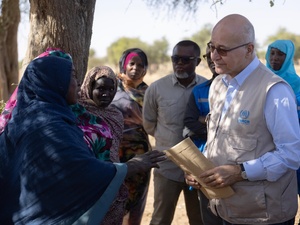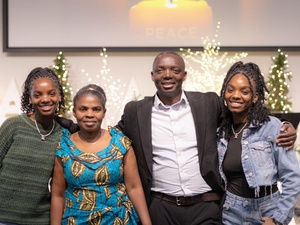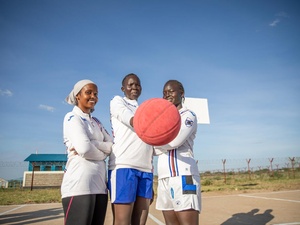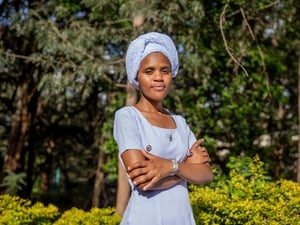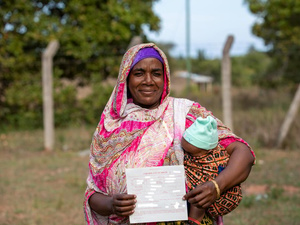Stitch by stitch, refugee women in Kenya craft new lives for themselves
Stitch by stitch, refugee women in Kenya craft new lives for themselves

In their sunny Nairobi workshop, refugee women in Heshima's Maisha Collective concentrate on turning out school uniforms.
NAIROBI, Kenya, 26 December 2013 (UNHCR) - Lydia Umutoniwase fixes her gaze on a sewing machine as she prepares to thread a needle. She is deep in concentration, despite the chatter of women and whir of other machines surrounding her. To her left is a pile of colourful scarves freshly pressed and ready for sale.
Lydia, 19, is one of the more than two dozen young refugee women who form the Maisha Collective. The group makes and sells tie-dyed textiles and scarves, allowing the members to learn a trade and earn an income.
"Maisha" means "life" in Kiswahili, and Lydia says for the members it has indeed opened the door to a new existence in a new country.
"When I was in the Democratic Republic of the Congo, I didn't have hope. But now, my life has changed," she says softly in halting English, but with a wide smile.
The scarves are sold at craft fairs and stores in Nairobi and online. Since the collective began in 2009, it has sold thousands of scarves -- to people who live as far away as Canada, the United States and Europe. What the buyers do not see are the proud faces of the young women -- all refugees who arrived in Kenya as children or teenagers on their own and are now able to pay their own rent and put food on the table.
"What's happened with Maisha is that they can take care of themselves, instead of people doing things for them," says Hamdi Ali Abdi, the collective's project assistant. "They become more confident."
The group is run by Heshima Kenya, a nonprofit organization that provides education, vocational training, a safe house and other services to refugee children and adolescent girls who arrive in Kenya alone from countries such as Rwanda, South Sudan and Somalia.
Many have been raped by militias or by husbands in forced marriages; some arrive with children. The UN refugee agency works with non-government agencies like Heshima Kenya to help women and girls re-establish their lives and gain their independence. Empowering refugee women is one of UNHCR's Global Strategic Priorities.
"With the Maisha Collective, now I know how to sew, I can tie-dye... now I see I have a future, like others," says Lydia.
Dahabo Maow, a Somalia refugee, was the power behind the collective. She fled Somalia after fighting broke out in her town and joined Heshima in Nairobi.
"She had her leg amputated and she felt she was hopeless in life," says Alice Eshuchi, Heshima's Senior Program Manager. "Feeling that hopeless, she did not want to even learn how to read or write. She had lost her parents. She went to Kakuma refugee camp, where she was mistreated, and she could not receive the services that she required due to her disability. So when she came to Heshima, the management realized that she had an ability to learn a skill. So we enrolled her in training for tailoring and tie-dye."
Dahabo began teaching the other young women at Heshima how to sew and tie-dye. Soon after, the Maisha Collective was formed.
"They are building their leadership skills," Alice says. "The girls actually empower the others by teaching them what they know."
The members of the collective receive 8,000 Kenyan shillings (US$100) each month, as well as valuable lessons on budgeting so they can prepare for the future. But they also receive much more than money.
"They form a family connection," says Hamdi. "They feel that they are all connected somehow. They all sit around and start doing the tasseling and they will talk. It's easier than counseling."
Hamdi says they might not open up to her, "but when they're all sitting down and a girl is talking about losing her father, or being raped, the others can relate. They all open up, they all talk."
Lydia lost her parents, brothers and sisters as she fled Congo two years ago - and to this day does not know whether they are dead or alive. The Maisha Collective has become her new community, her hope and her new life.
"I found other girls who have many problems like me," Lydia says. "I am so happy I found them. We are like sisters."
By Shirley Camia in Nairobi, Kenya


